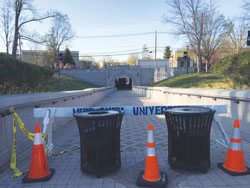Two faculty members at Monmouth University are spearheading the Autism Program Improvement Project, a unique program where educators and paraprofessionals in local school districts receive further training on how to work with children on the autism spectrum.
The project is led by Stacy Lauderdale, Ph.D., Department Chair and assistant professor in the Department of Special Education, and Mary Haspel, an instructor in the same department. The two professors, who also created the high-ranking Applied Behavior Analysis program, is currently being tested in four nearby school districts.
“We have four very substantial partner districts,” said Haspel. “We’re working out in the classrooms with the teachers [of students with autism] to provide professional development and training, and to enhance their programs and increase capacity in terms of resources and support for students.”
The project is funded by a grant from Autism MVP, a local organization who is “solely invested in improving public school programming for students with autism,” said Haspel.
“The Autism Program Improvement Project was born from many discussions with Dr. Stacy Lauderdale,” said Keith Green, the founder and executive director of Autism MVP. “To hear how successful it’s been so far validated the reason we formed as an organization.”
According to Lauderdale, the project works with teachers on the implementation of evidence-based practices; the majority of the practices are based on the principles of applied behavior analysis.
Originally, Haspel and Lauderdale were each personally interested in their own versions of projects, and wound up collaborating together. They wrote grants and developed the model together, and received specific training in evaluation tools, which allowed them to develop their own system and effectively evaluate the needs of programs in schools.
“It was a very deliberate collaborative process, based upon our personal invested interest in increasing the quality of public-school autism programs,” said Haspel.
Both women were also teachers before working in higher education, something Lauderdale believes fueled their passion for the project.
“We have seen what the struggles are, to meet the needs of students with autism,” said Lauderdale. “It’s even more so in a public school setting, because of the limited resources available there. We’re both really invested in ensuring that children’s needs are getting met, and with helping provide teachers with the training they need in order to meet those needs.”
According to Haspel, they deliberately looked at models that already exist for public schools and found that the currently-used models were limited due to being based on clinical models, which use a different method of staffing and training, or because they are not aligned to the needs of the state and its structure in terms of the school system – for example, a model developed in Pennsylvania, which has a different school structure, may have been used.
“Basically, we had to invent something that could work for our state,” said Haspel.
The eventual plan is to create a viable statewide model within three or four years; last year, they tested a pilot model and are currently running what they call their ‘anticipated model’.
“It is our belief that not only is there a severe shortage of professionals needed to work with those who have autism, but the ones already in the field need the best and most up to date training,” said Green. “This is a gap in our educational system that we are proud the Autism Program Improvement Project is meeting in area schools, made possible by the Autism MVP Foundation’s support.”
“I’m excited about it,” said Mary Brennan, chair of the special education department and specialist professor. “I was present at the initial meetings with administrators from the schools that were involved. I think it is an outstanding way to engage teachers in the field with the best approaches to helping students with autism. It’s a tough field, and no two students are alike, so they need a plethora of activities, strategies, approaches, and ideas to work with. Both Mary and Stacy have the passion to make it work.”
John Henning, the dean of the school of education, said that he has become something of a “cheerleader” for the project.
“I support it, and cheerlead for it, and talk to other people about it,” he said. “The program is a tremendously positive reflection on the school of education; it’s one of our premium projects, and it’s being carried out excellently by the faculty involved, and by the department that’s overseeing it.”
Currently, Lauderdale and Haspel are the only people directly involved with the project, and are currently looking for funding to start training additional people, so the project can expand, according to Lauderdale. They are also developing a webpage with Monmouth University, which will illustrate what the model is about, as well as creating increased awareness of the project.
PHOTO TAKEN by Nicole Riddle



